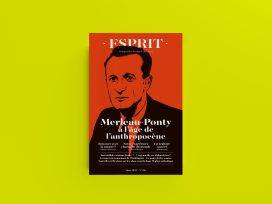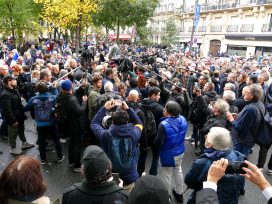Abstracts Esprit 10/2004
Marc-Olivier Padis
Europe’s proposed constitution: What lies behind the “No”?
The decision by former French Socialist prime minister Laurent Fabius to campaign against the proposed European constitutional treaty has set off a vast debate that may revolve around the wrong type of issue. What can we really expect from the treaty? Does it set in stone the future of the continent? Has it anything to do with the perceived lack of democracy in the EU institutional and operational framework? How can comprehensive EU policies regarding welfare and industrial relations be developed?
Éric Maurin
France’s own type of urban ghetto
Whereas urban ghettoes as symbols of ethnic segmentation have become a talking point for the French media, it appears that the social divisionism at work behind territorial strategies in the country is a much more complex phenomenon than usually envisaged. It has less to do with the secession of a portion of the population out of a refusal to join the mainstream, than with the avoidance strategies that lead each social group to stay away from the one sitting immediately below them on the scale of hardship.
Jean-Pierre Dupuy
The over-medicalising of life. Medicine and power: A tribute to Ivan Illich
Ivan Illich died just as reality was validating his views once again,particularly with regard to medicine. But then his rejection of medical power calls for genuine understanding in the first place: far from placing a heavy burden of responsibility on individuals, his rejection is inspired by a defence of both liberty and a quest for a certain lifestyle.
Bernard Vincent
Paul Goodman, a prophet for the present and Illich’s forerunner
The work and personality of American sociology scholar Paul Goodman were a source of inspiration to Ivan Illich, particularly Goodman’s abhorrence of systematic reasoning , his mistrust of government institutions and an unconditional preference for non-violence; these pinpointed the way he looked not just at society but also to the human condition.
Philippe Capelle et Henri-Jérôme Gagey
A traditional academic meeting of minds between faith and reason
In his recent report to the French government on the teaching of the “facts of faith”, Régis Debray has advocated a rational, government-controlled type of knowledge dissemination. Here the deans of the country’s catholic university colleges claim for themselves a role in such enlightened education, as there is no reason, in their view, for a priori denying the capacity of confessional institutions to engage in rational discussion.
Jean-François Barbier-Bouvet
Knowledge, misconceptions and ignorance of religion
Demands for an academic or neutral teaching of “the facts of faith” is often based on an awareness of the growing ignorance of the references to religion that are part and parcel of our history, our lifestyles and the ways we look at the world. The author assesses the situation and pinpoints the causes behind this fundamental trend.
Nacera Belaza
Dancing and the unveiling of bodies (Interview)
A professional dancer and choreographer, Nacera Belaza bridges the cultural gaps between France and Algeria. Here she discusses her experience and impressions regarding her relationship to the physical body, space and movement.
Gilbert Grandguillaume
Languages in the Maghreb: Bodies calling for voices
In the three countries of the Maghreb region and against a multilingual background, people’s relationship with language involves both imagination and identity, as well as the legacy of history and political inclination. This makes for a difficult relationship to multilingual diversity for both individuals and communities. Yet, these countries could view their multilingual potential as an asset at a time when they feel a pressing need to open up to the world.
Pierre Vermeren
In the new Morocco, is the monarchy facing Islamic radicals on its own?
The May 2003 bomb attacks in Casablanca caught short Morocco’s rulers, who had been too keen to deny that Islamic radicalism might be a problem; the outrage also exposed the limitations of the monarch’s capacity for initiative. How are we to understand the king’s political strategy? And what can it lead the country on to?
Sophie Bessis
Tunisia’s precarious standstill
France is a strong political supporter of president Ben Ali, who is engineering his re-election this month whilst turning a blind eye to civil and political liberties. Behind a facade of stability, the country’s political standstill fails to respond to the population’s demands.
Jean-Pierre Peyroulou
Algeria buffeted by strife
After 12 years’ civil war, violence and corruption keep undermining daily life in Algeria. Instead of trying to sort out a deliberately opaque political sphere, it is better to listen to what the many disappeared and displaced suggest about a society that is at a loss how to break away from the cycle of violence.
Matthew Connelly
Algeria’s independence: A diplomatic revolution
An internal issue for France, Algeria’s independence war was also waged in the diplomatic sphere. This historic research paper, so far unavailable in French, shows that the Algerians managed to turn their fight into an international issue, which resulted in France’s diplomatic marginalisation and paved the way for her ultimate failure.
Published 6 October 2004
Original in French
Contributed by Esprit © Esprit
PDF/PRINTNewsletter
Subscribe to know what’s worth thinking about.



